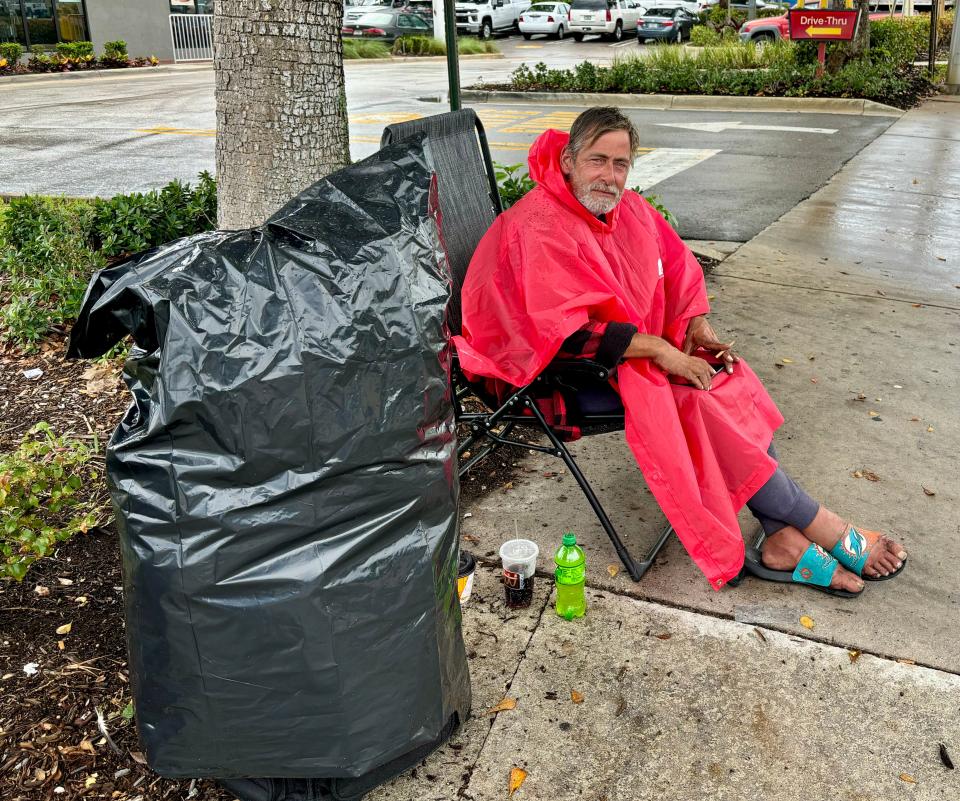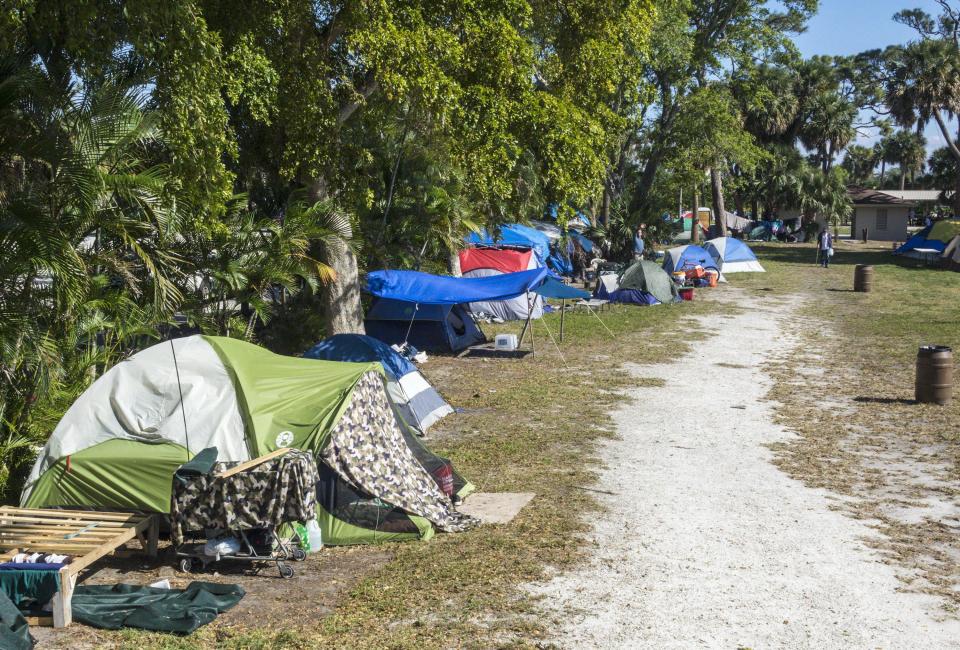New Florida law on where homeless people can sleep could be costly for local governments
- Oops!Something went wrong.Please try again later.
Local governments could be required to pony up big money to meet the demands of legislation Gov. Ron DeSantis signed barring homeless people from either camping or sleeping on public property.
The legislation, which takes effect on Oct. 1, requires local governments to designate a public space for camping or sleeping if shelter spaces are full. Local governments must also provide security, behavioral health services and bathrooms with running water, but Tallahassee is not sending additional money, so local governments can fulfill that mandate.
City officials are still looking into what the legislation, H.B. 1365, might mean for them.
"The governor signed HB 1365 on Wednesday, March 20," West Palm Beach Director of Communications Diane Papadakos said. "According to the bill, the legislation would not become effective until October 1, 2024. Mayor James and staff will be meeting internally to determine how the city will address and implement changes."
The legislation sets aside $30 million for so-called "wrap-around" services for the homeless, but critics say that's not nearly enough.
"We're going to need so much more funding if we're going to build up these resources," Megan Sarmento, an outreach program manager for the Florida Harm Reduction Collective in Tampa, told USA Today. "Even now, how the system is, we are finding people on the streets and are unable to link them to care because of the lack of resources, including housing and detox."

John Prince Memorial Park near Lake Worth Beach had served as a sort of unofficial public space for the homeless in Palm Beach County.

But four years ago, after area residents expressed security concerns, the county cleared the 726-acre park, where homeless people had set up camp in what they called "Tent City."
Last year, a pointin-time count showed that there were 1,855 homeless people in the county — 1,169 of whom were not staying in a place designed for habitation and another 686 staying in a homeless shelter or transition center.
Multiple agencies and local governments provide services for homeless people in Palm Beach County, but beds remain limited.
The homeless dilemma in West Palm Beach: 'They don't want me here, but I have no place to go'
Homeless people still sleep in parks, in vegetation just beyond rights-of-way and even on sidewalks.
West Palm Beach's Kelly Perkins, 58, said he is ambivalent about the legislation from Tallahassee, which elicited eye rolls and shrugs when it was described to him.
"It's a Catch-22," said Perkins, who has been homeless for four years and is entrenched in his current domain on a Belvedere Road sidewalk. "They don't want me here, but I have no place to go."
Perkins said he's seen and heard the threats from authorities before.
RELATED: The Lord's Place in West Palm celebrates opening of larger facility to help serve homeless
RELATED: Can groups feed the homeless in city parks? West Palm Beach looks to amend ordinance
RELATED: Plea for help to Riviera Beach detective from homeless woman with newborn has warm ending
"One time a police officer said I couldn't stay on the sidewalk, and he took me to a homeless shelter," Perkins said. "Well, after three days, they said I couldn't stay there anymore, so I just came right back here."
Palm Beach County already has an ordinance making it unlawful for any person at any time to sleep in the open on private property, in vacant lots in or under any bridge or structure without the permission of the owner. The county also prohibits any person from sleeping on any public beach between the hours of midnight and 6 a.m.
Can the homeless stay overnight in a Palm Beach County park?
As for county parks, no one is permitted to stay overnight unless a permit is obtained.
County jurisdiction, though, applies to unincorporated areas, which is, for the most part, west of Military Trail.
Many political conservatives have pointed with derision at homelessness in large cities led by political liberals. Conservatives argue that liberals invite the problem through permissive policies that contribute to a degradation of an area's quality of life.
"These are difficult issues, but you should not be accosted by a homeless like we see," DeSantis said during a news conference Wednesday. "You should be able to walk down the street and live your life."
Advocates for homeless people say the approach to the problem has often been hard-hearted and dehumanizing.
They decried a move by West Palm Beach last year to require people and groups to get a permit in order to carry out large-scale feeding programs in public parks.
James said the move was necessary to make sure the city's parks remain places where all citizens feel comfortable.
For his part, Perkins said he doesn't want to be homeless, but said in his state, it is difficult to find and maintain work.
"I don't like sleeping outside," he said. "I don't like being in the rain. I have 20 cents to my name. I've had jobs before, but look at me. … Would you hire me?"
Palm Beach Post Staff Writers James Coleman and Mike Diamond along with USA Today Network's Florida Capital Bureau reporter John Kennedy contributed to this report.
This article originally appeared on Palm Beach Post: New Florida law on where homeless can sleep has impact on West Palm

